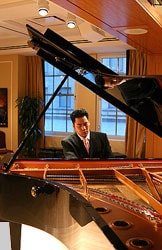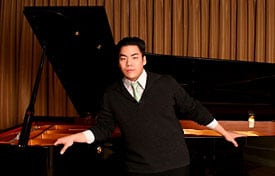Rufus Choi Pursues the Magic of the Moment
 Pianist Rufus Choi performs at Yamaha Artist Services in New York City. |
Couple his passion to communicate with the technique that he developed through study with virtuosos like Vladimir Krainev and Yamaha artist Oxana Yablonskaya, and it's easy to see why Choi's repertoire leans toward Romantic blockbusters, particularly with a Russian flavor: Tchaikovsky, Rachmaninoff, Prokofiev. Not surprisingly, he'll be performing in 2006-07 in Russia, with the St. Petersburg Philharmonic Orchestra, and touring Germany with the Russian Chamber Philharmonic Orchestra as well.
But the spiritual essence of Mozart and Beethoven also attracts Choi. For the same reason, he performs Busoni transcriptions of Bach, which he believes enhance the purity of the composition with the intensity of bravura performance.
"I love Busoni's arrangements of Bach precisely because they are not literal," he explains. "He wrote for the piano the strength and color and nuance, which is why even though I'll add a few notes here and there, maybe a couple of octaves, I let his ideas speak for themselves."
 Pianist Rufus Choi |
This would be a challenge under any circumstances, but certainly more so if Choi had to worry over whether his instrument would be up to the job. "That's one reason why I'm a Yamaha artist," he explains. "Yamaha pianos are consistent. They sound great too, so when I play with an orchestra I never have to force the sound out of the piano; it's big enough to come out on its own. The best thing, though, is the action. Because I play quite a demanding repertoire, I need a great action, and the Yamaha is never difficult to play."
For more information, write Yamaha Corporation of America, P.O. Box 6600, Buena Park, CA 90622, telephone (714) 522-9926, or email infostation@yamaha.com.
About Yamaha:
Yamaha Corporation of America manufactures a complete line of musical instruments, professional audio products, customer-driven support products and computer-based products targeted to both the amateur and professional markets.
 |
| © 2010 Yamaha Corporation of America. All rights reserved. |
